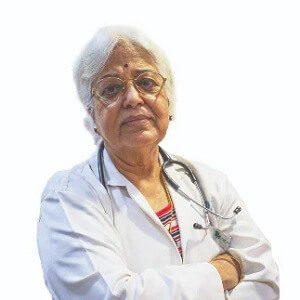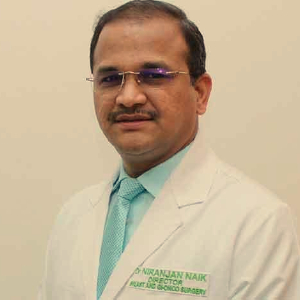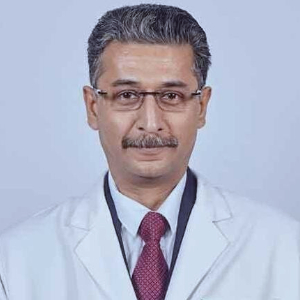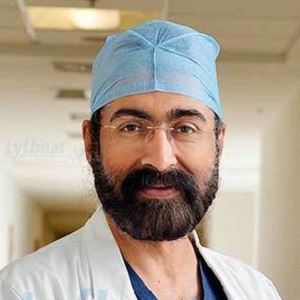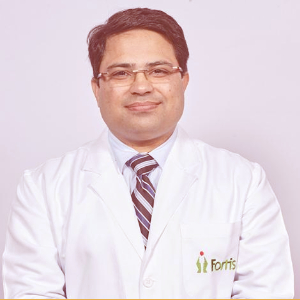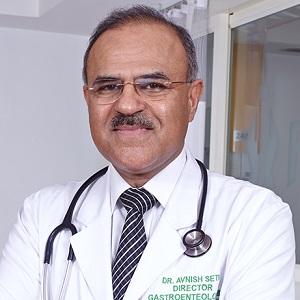Best Doctors in India for Alcoholic Hepatitis Treatment
- Eye Surgeon, Ophthalmologist, New Delhi, India
- Over 24 years’ experience
Profile Highlights:
- Dr. Parul Sharma is a renowned ophthalmologist and eye surgeon with a track record of outstanding performance throughout her career in academics, diagnostics, and surgery.
- She is known to keep an active interest in the latest developments of most subspecialties in ophthalmology including academics. Dr. Parul Sharma also gained experience from prestigious national and international eye institutes.
- Obstetrician & Gynaecologist, New Delhi, India
- Over 55 years’ experience
Profile Highlights:
- Dr. Shakti Bhan Khanna is a well-known obstetrician and gynecologist in New Delhi. She has over five decades of work expertise in academics and this arena.
- A specialized ‘Khanna’s Sling Operation’ technique for Vault Prolapse developed from her Obstetrics and Gynecology experience has received immense success.
- Dr. Khanna is working as a senior consultant at Indraprastha Apollo Hospital and Apollo Cradle & Children’s Hospital since December 1995.
- Dr. Khanna specializes in complex reproductive treatments, gynecological laparoscopy, gyne-endocrinological treatment, infertility and high-risk pregnancies, and pelvic reconstructive surgery.
- Dr. Khanna has delivered many orations and received various felicitations.
- Surgical Oncologist, Gurugram, India
- Over 20 years’ experience
Profile Highlights:
- With 20+ years of experience, Dr. Niranjan Naik is one of the reputable names in the field of oncology and has performed more than 12000 onco-surgical operations so far, including many advanced and complex onco-surgical operations.
- Dr. Naik is generally considered one of the best Breast Cancer surgeons in India. He is also well versed in diagnostic and therapeutic endoscopic procedures.
- Neurosurgeon, Gurugram, India
- Over 22 years’ experience
Profile Highlights:
- Dr. Sandeep Vaishya is a renowned Neurosurgeon in India, with over 22 years of proficient experience in the field of advanced neurosurgery.
- He has closely worked with some of the top-notch institutes and hospitals in India.
- Dr. Vaishya is regarded as one of the top surgeons of Gamma Knife Surgery in South Africa and is also considered a renowned surgeon for brachial plexus injuries.
- Liver Transplant Surgeon, Gurugram, India
- Over 21 years’ experience
Profile Highlights:
- Known to be a pioneer in the field of liver transplantation, Dr. Arvinder Singh Soin leads one of the world’s most successful liver transplant programs at Medanta. Currently, he is the Chairman of the Institute of Liver Transplantation and Regenerative Medicine, at Medanata- The Medicity, Gurgaon, India.
- Quite renowned for having a 95 percent success rate, and having performed over 2500 liver transplants throughout his career, Dr. Arvinder Singh Soin was awarded the Padma Shri by the President of India, for his contributions to the field of Medicine.
- Surgical Oncologist, New Delhi, India
- Over 20 years’ experience
Profile Highlights:
- One of the finest oncologists in India, Dr. Ruqaya Ahmad Mir has been practicing surgical oncology for the past 20 years and is currently functioning as a Senior Consultant, Oncology at Indraprastha Apollo Hospital, New Delhi.
- Dr. Ruqaya Mir is known for her outstanding performance in some of the advanced surgical techniques which include Uterus and Ovary and Limb Conservation surgery and Cytoreductive surgery and Hyperthermic Intraperitoneal chemotherapy for advanced colorectal and recurrent ovarian malignancies.
- She is also a well trained Robotic Surgeon practicing implementation of minimal invasion in surgical oncology.
- Liver Transplant & HPB Surgeon, Gurugram, India
- Over 17 years’ experience
Profile Highlights:
- Dr. Vivek Vij is considered one of the most reputed liver transplant surgeons who has over 17 years of proficient experience and has performed multiple exemplary medical procedures involving advanced surgical skills that cover the entire gamut of gastroenterological surgeries.
- Dr. Vivek Vij’s expertise lies in Adult & Paediatric Liver Transplant, Complex Liver Surgery, Advanced Pancreato-biliary Surgeries, Advanced Laparoscopic and Robotic Surgeries, Basic Science Research, and Regenerative Medicine. His outstanding expertise in liver transplant procedures has earned him many accolades and prestige.
- Gastroenterologist, New Delhi, India
- Over 27 years’ experience
Profile Highlights:
- Dr. Avnish Kumar Seth is a well-renowned name in the field of gastroenterology. With fellowships in Liver transplant (Birmingham, UK) and Endoscopic ultrasound (South Carolina Alabama, USA), Dr. Avnish Seth’s areas of interest include treatment of hepatitis B, Hepatitis C, liver transplantation, and advanced GI endoscopic procedures.
- Dr. Avnish Kumar Seth has over two decades of experience in Gastroenterology Hepatobiliary Sciences. An expert in Diagnostic Therapeutic GI Endoscopy, Colonoscopy, ERCP, and Liver Transplantation.
- Transplant Surgeon, New Delhi, India
- Over 33 years’ experience
Profile Highlights:
- With more than 33 years of experience, Padma Shri awardee Dr. Sandeep Guleria is renowned for being the key member of the team that conducted the first two Kidney Pancreas Transplants in India.
- Currently, he is a top-notch Kidney Transplant Specialist working at Indraprastha Apollo Hospitals, New Delhi.
- He has worked as an additional professor, in the department of surgery at All India Institute of Medical Sciences. Currently, he is a senior consultant surgeon in General Surgery, GI Surgery, and transplantation.
- Dr. Guleria puts emphasis on diet and lifestyle changes as they are quite an important part of treatment in treating early kidney diseases.
- His special area of interest is organ transplantation. He has spent around two years in the United Kingdom at the Royal Free Hospital in London where he was actively involved in the renal transplant program. From London, he was appointed as a Transplant Fellow in the Academic Surgical Unit at St. James’s University Hospital. There, he trained extensively in liver, kidney, and pancreas transplantation.
- Every year, he performs around about 70 live-related renal transplants.
He also started a simultaneous kidney and Pancreas Transplant program in India and performed the first successful simultaneous kidney-pancreas transplant in the country.
- IVF Specialist & Gynaecologist, New Delhi, India
- Over 30 years’ experience
Profile Highlights:
- Dr. Sonia Malik is a renowned gynecologist and obstetrician in India specializing in IVF and ART.
- Dr. Sonia Malik founded the Southend Fertility and IVF Center with the motive of helping infertile couples have a family, and the clinic is considered one of the best in India.
- She holds an extensive experience of 30+ years in Gynecology, Obstetrics, and Infertility and specializes in various types of ARTs including IVF, ICSI, and IMSI. Dr. Malik has performed over 8000 fertility procedures with around 25 IVF cycles and 20 IUI cycles every month.
Best Hospitals in India for Alcoholic Hepatitis Treatment
ALCOHOLIC HEPATITIS
Alcoholic hepatitis is a liver infection, which is mainly caused by frequent, heavy use of alcohol. Fat can build up in the liver cells, which might lead to inflammation as well as scarring of the liver.
Alcoholic hepatitis might be mild or severe. A patient might even need a liver transplant if proper treatment is not provided, or if they don’t stop consumption of alcohol.
It is also notable that all heavy drinkers don’t develop this condition, and sometimes this condition even develops in people who drink moderately. However, if you are diagnosed with this condition, it is important for you to quit drinking alcohol. People who continue drinking alcohol might face a huge risk of serious liver damage as well as death.
Symptoms
Depending on the amount of damage to the liver, the symptoms can vary. If you are having a mild form of the disease, you might not even experience any symptoms at all. However, as the damage continues to grow, you might experience the following:
- Changes in appetite
- Dry mouth
- Weight loss
- Pain or swelling in the abdomen
- Jaundice, or yellowing of the skin or eyes
- Fever
- Nausea and vomiting
- Easy bleeding or bruising
- Changes in your mental state, including confusion
- Fatigue
The symptoms of this condition are similar to those caused by a few other health conditions. Therefore, if you develop any of these symptoms, it is best to get a proper diagnosis as well as begin treatment.
Causes & risk factors
Alcoholic hepatitis generally develops when the alcohol you drink causes damage to your liver. However, it is not clear why alcohol does this damages only to some heavy drinkers.
Few factors that are known to play a role in this condition include:
- The body’s process that breaks down alcohol produces some toxic chemicals
- These chemicals can trigger inflammation that can destroy the liver cells
- Thus, over time, scars replace healthy liver tissue, thus interfering with the function of the liver
- This irreversible scarring, which is also termed cirrhosis, is the final stage of alcoholic liver disease
If you have hepatitis C and continue to drink, even moderately, you are more likely to develop cirrhosis.
Some heavy drinkers are also malnourished because they don’t eat a proper balanced diet. Alcohol and its byproducts also prevent the body from absorbing nutrition properly. Lack of nutrition can contribute to liver cell damage.
Some other risk factors that can lead to this condition include:
- Your sex- Women are usually at a higher risk of developing alcoholic hepatitis since the way alcohol is processed in women is different.
- Binge drinking- Having over five drinks within two hours for men and four or more for women can increase the risk of alcoholic hepatitis.
- Obesity- Heavy drinkers who are overweight are also more likely to develop alcoholic hepatitis and to progress from that condition to cirrhosis.
- Race and ethnicity- Hispanic and Negroid people might be at higher risk of alcoholic hepatitis.
- Genetic factors- According to studies, there may be a genetic component in alcohol-induced liver disease. However, it is difficult to separate genetic and environmental factors.
Diagnosis
If you are showing symptoms of alcoholic hepatitis, your doctor will first inquire about your medical history and alcohol consumption. Next, he/she will perform a physical exam to see if you have an enlarged liver or spleen. They might also need a few more tests to confirm your diagnosis, such as:
- Complete blood count (CBC)
- Liver function test
- Ultrasound of the liver
- Abdominal CT scan
- Blood clotting tests
In some cases, a liver biopsy might also be needed to confirm the diagnosis of alcoholic hepatitis. A liver biopsy requires your doctor to remove a tissue sample from your liver, which is then tested in the lab. This method helps to show the severity and type of liver disease.
Treatment
Stopping alcohol consumption is the most important treatment for alcoholic hepatitis. There is no cure for this condition, but treatment can help in reducing or eliminating symptoms, or stopping its progression.
It is also important to note that scarring of the liver is permanent, but treatment can aim to restore as much function as possible.
Dietary changes
Medication
Liver transplant
The best hope of recovery is to be aware of the signs and symptoms as well as to reduce, manage, or if possible, completely stop consumption of alcohol.
Complications
Alcoholic hepatitis might lead to severe other complications such as:
- Enlarged veins (varices)- In this condition, blood that is unable to flow freely through the portal vein, can back up into other blood vessels in your esophagus or stomach.
- Hepatic encephalopathy- This condition can be caused by the buildup of toxins if your damaged liver is unable to remove all the toxins from your body. It involves confusion, drowsiness, and slurred speech.
- Ascites- Ascites is a condition in which the fluid that accumulates in the abdomen may get infected and thus, require treatment with antibiotics. Although this condition is not life-threatening, it can be a sign of advanced alcoholic hepatitis, or cirrhosis.
- Kidney failure- A damaged liver affects blood flow to the kidneys, thus resulting in kidney failure.
- Cirrhosis- The scarring of the liver might lead to liver failure.
Prevention
Alcoholic hepatitis might be prevented if you take the following steps:
- Drink alcohol in moderation, if at all- For healthy adults, moderate drinking means no more than one drink a day for women of all ages and men older than 65, and not over two drinks a day for men aged 65 and younger. However, if you prevent all alcohol, it is a certain way to prevent this condition.
- Check before mixing medications and alcohol- Ask your doctor if it’s safe to drink alcohol while you are taking medications. Consider reading the warning labels on over-the-counter medications as well. Don’t drink alcohol when you are taking medications that warn of complications when combined with alcohol.
- Protect yourself from hepatitis C- Hepatitis C is an infectious liver disease that is caused by a virus. If it is left untreated, it may lead to cirrhosis. If you are having hepatitis C and you consume alcohol, you’re generally more likely to develop cirrhosis than if you don’t drink.


